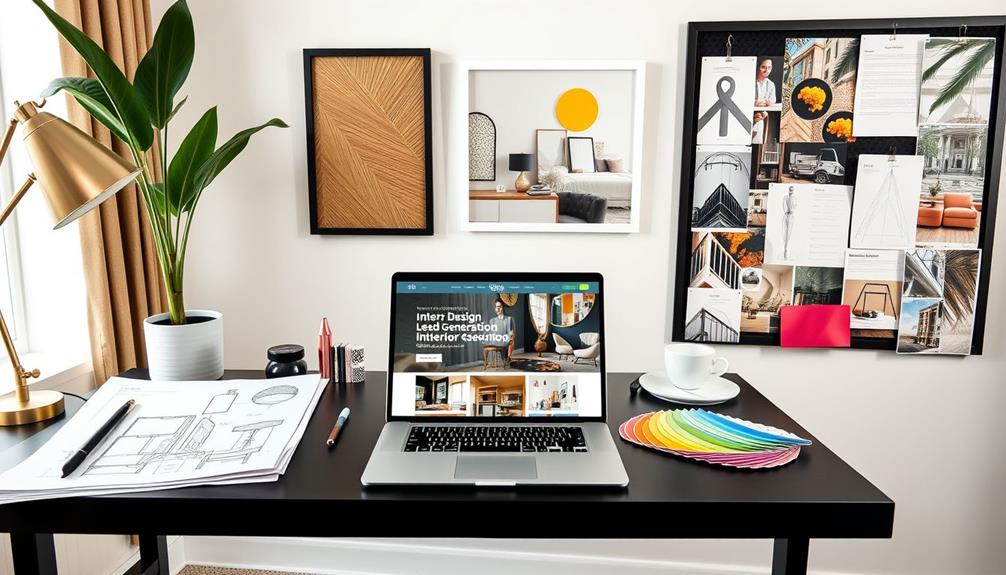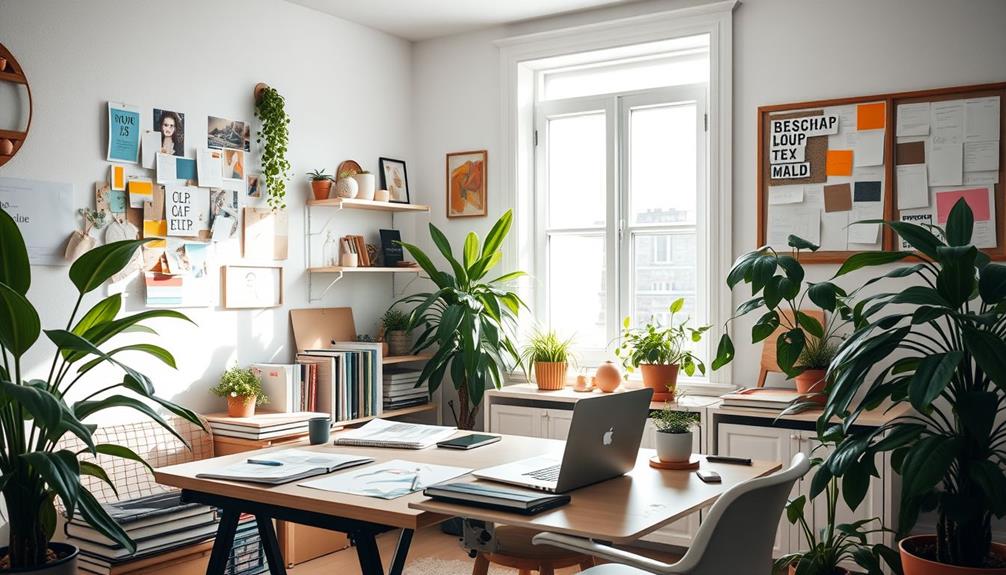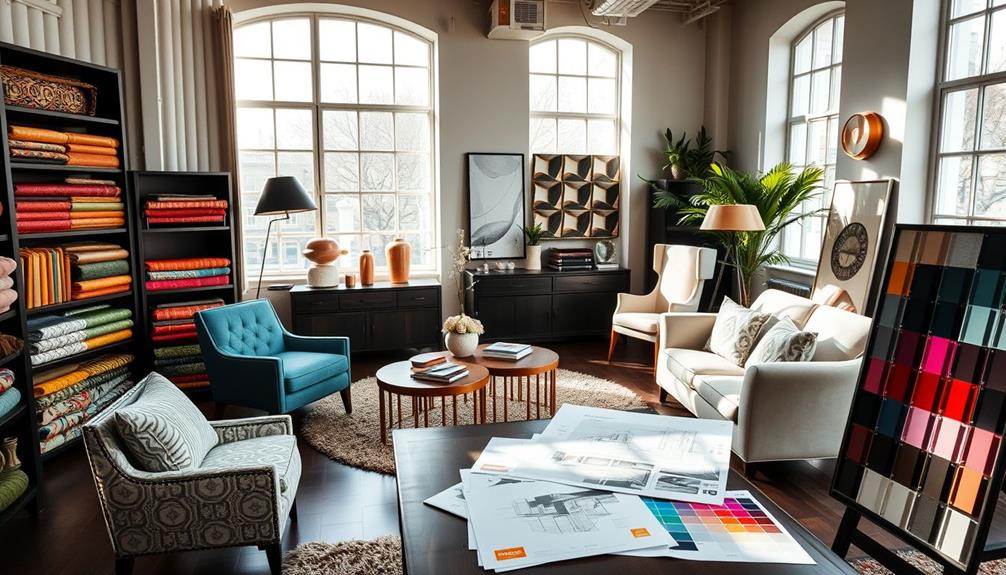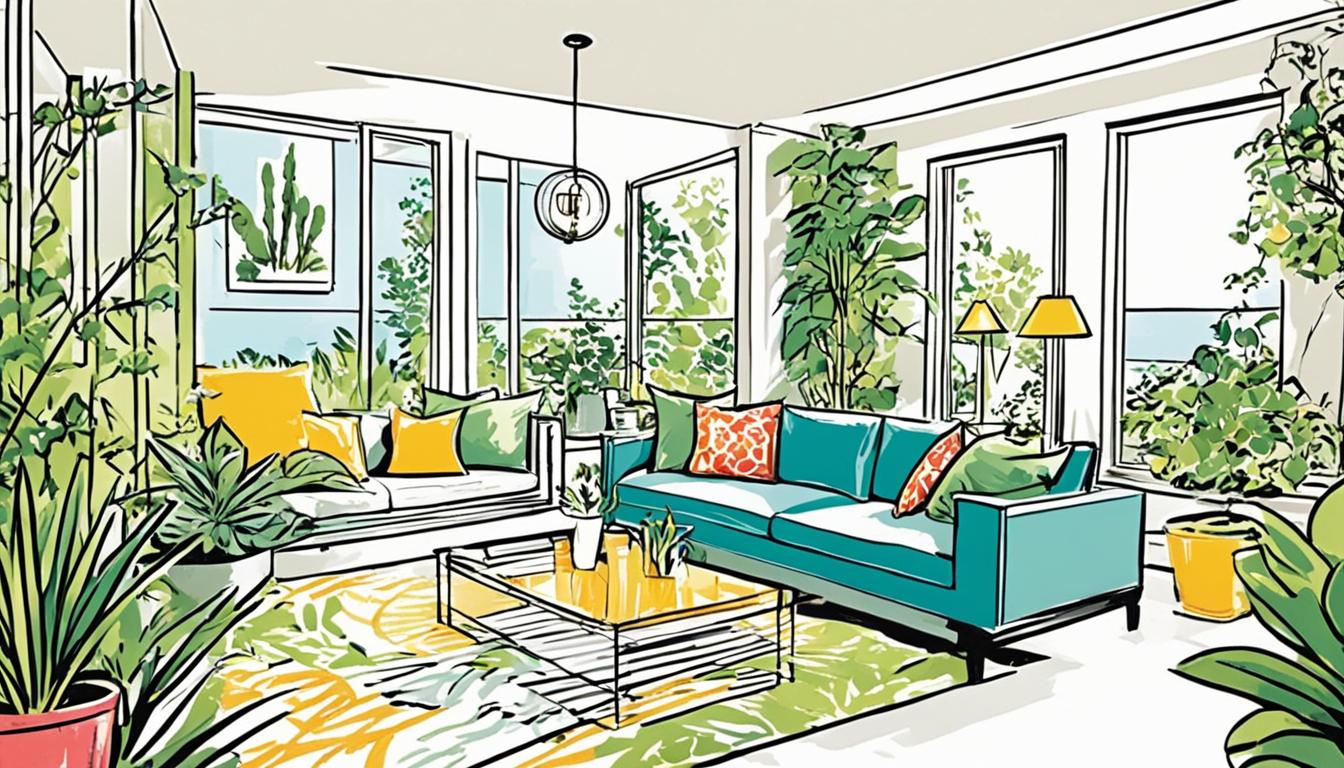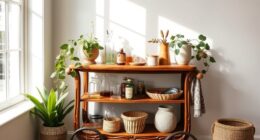To get leads for your interior design business, focus on consistent lead generation strategies. Start by creating engaging content, like educational blogs and success stories, that showcase your expertise. Leverage social media platforms like Instagram and Pinterest to share high-quality images and connect with potential clients. Optimize your website for mobile users, ensuring strong calls-to-action guide visitors. Building partnerships with local real estate agents or home decor retailers can also generate referrals. Finally, consider utilizing online directories to boost your visibility. If you want to enhance these strategies further, keep exploring various tactics that can elevate your business. As you continue to refine your lead generation efforts, explore additional interior design marketing strategies such as email marketing campaigns and targeted online advertising. Engage with your audience through webinars or virtual consultations, offering valuable insights into your design process. By implementing a combination of these interior design marketing strategies, you can effectively attract and convert leads for your business. To ensure that you can effectively manage and nurture the leads you generate, it’s also important to focus on interior design client files organization. Implementing a robust system for organizing client information and project details will help you stay organized and provide excellent customer service. Utilizing a customer relationship management (CRM) system can streamline the process and ensure that no lead falls through the cracks. By focusing on both lead generation strategies and interior design client files organization, you can set your business up for success and growth.
Key Takeaways
- Develop a strong online presence through SEO-optimized blogs and engaging social media content to attract potential clients.
- Utilize online directories like Houzz and Yelp to enhance credibility and connect with homeowners seeking interior design services.
- Create educational and interactive content, such as quizzes and success stories, to showcase expertise and engage your audience.
- Build strategic partnerships with local real estate agents and home decor retailers to generate referrals and broaden your network.
- Offer virtual consultations to expand your reach beyond local clients and provide tailored design solutions.
Importance of Lead Generation

Lead generation is essential for any interior design business, and it can make all the difference in maintaining a steady flow of clients. Without a strong lead generation strategy, you risk entering a feast or famine cycle that can jeopardize your success. Engaging in daily lead generation activities increases your chances of attracting potential clients and keeps your pipeline active.
Effective lead generation tactics not only improve your visibility but also enhance your engagement with potential clients. By utilizing digital marketing alongside traditional methods, you can reach a broader audience.
It's vital to understand the difference between general leads and sales-qualified leads (SQLs). SQLs show a genuine interest in your services, which means they're more likely to convert into paying clients.
Nurturing these leads over time helps build lasting relationships, transforming initial interest into loyalty. You can also leverage your existing clients for referrals, which can lead to new qualified leads.
Effective Content Strategies
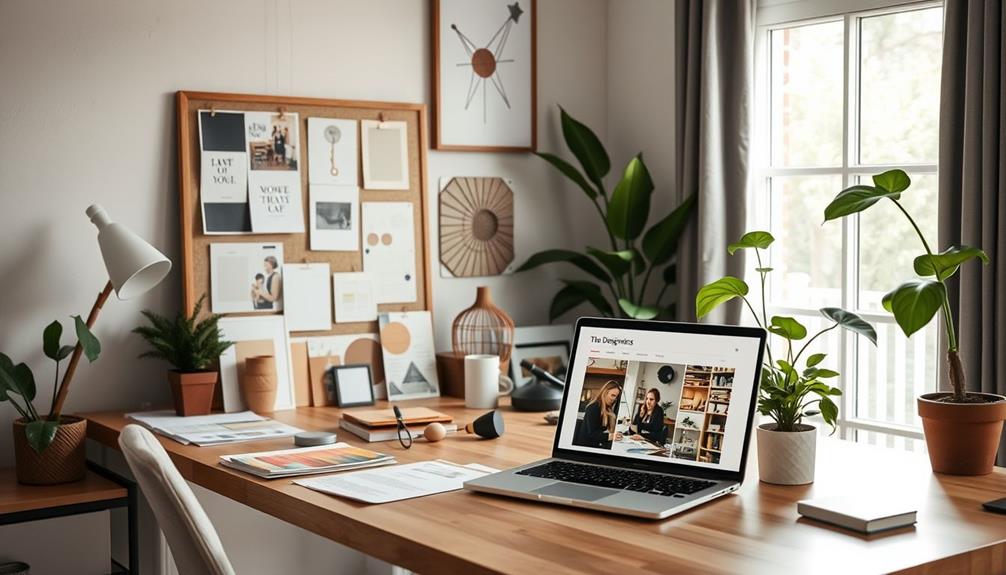
Consistently creating engaging content is essential for attracting potential clients to your interior design business.
By implementing effective content strategies, you can establish your authority in the field and generate leads for interior design projects.
Here are some actionable tips:
- Create educational blogs that offer valuable insights and tips to your audience, such as best window treatments to enhance home decor.
- Utilize SEO techniques such as keyword optimization and local SEO strategies to enhance your online visibility.
- Incorporate interactive content like quizzes and virtual design tours to captivate your audience and increase engagement.
- Share success stories and project features on visually-driven platforms like Instagram and Pinterest to inspire potential clients.
Leveraging Social Media

To attract potential clients, you need to focus on a visual content strategy that highlights your best interior design projects on platforms like Instagram and Pinterest.
Incorporating elements of nature and tranquility in your presentations can resonate with audiences seeking a cozy aesthetic, similar to cottagecore home office inspiration.
Engaging with your audience through polls and Q&A sessions will help build a loyal community around your brand.
Visual Content Strategy
Leveraging visually-driven platforms like Instagram and Pinterest can dramatically enhance your interior design business's visibility and client engagement.
With over 80% of users discovering new products and services on these platforms, creating a solid visual content strategy is essential for attracting interior design leads.
Additionally, utilizing social proof influences decision-making can further enhance your credibility and attract potential clients to your designs.
Here's how you can make the most of your social media presence:
- Post high-quality images of your designs regularly; compelling visuals can boost views by 94%.
- Use relevant hashtags strategically; posts with hashtags see 12.6% more engagement, making your content more discoverable.
- Engage actively with your audience through comments and direct messages; responding to comments can increase customer engagement by 20-40%.
- Highlight unique design features through stories and reels, as video content generates 1200% more shares than text and images combined.
Community Engagement Tactics
Building strong connections within your community is essential for attracting leads in the interior design business. Leveraging social media can greatly enhance your community engagement efforts. Consider the following tactics:
| Strategy | Description | Benefits |
|---|---|---|
| Engage on Local Groups | Join Facebook groups to build relationships and trust. | Increased local visibility |
| Host Instagram Live Q&As | Showcase your expertise and interact directly with followers. | Strengthened community ties |
| Create Pinterest Boards | Highlight local design projects to attract attention. | Greater local visibility |
| Share Client Testimonials | Regularly post project updates and testimonials. | Build trust and credibility |
| Run Contests or Giveaways | Host community-focused events on Instagram. | Boost brand awareness |
Optimizing Your Website
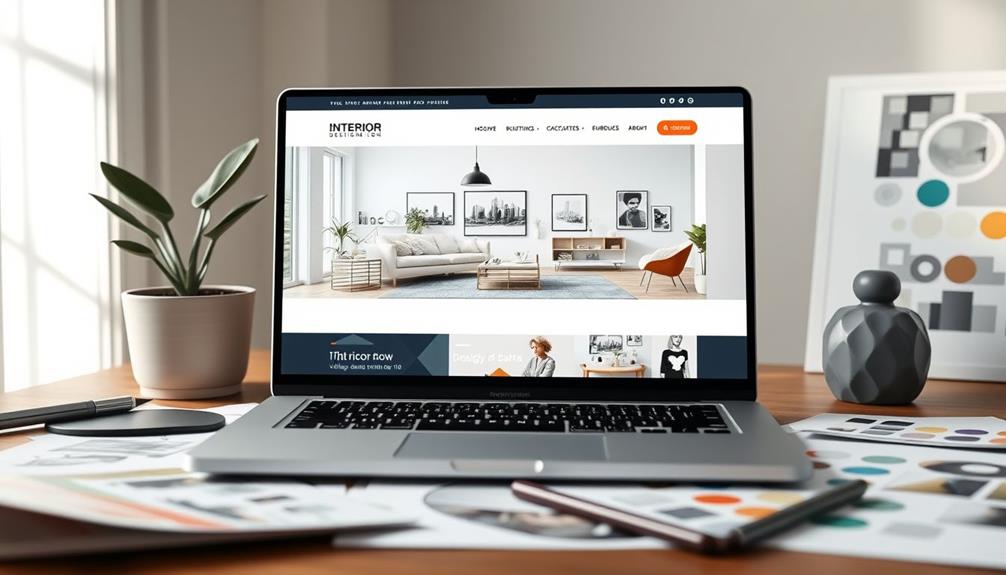
A well-optimized website is essential for attracting leads in the interior design business. To maximize lead generation for interior design, focus on several key elements when optimizing your website:
- Verify your website is mobile-optimized, as over half of all web traffic comes from mobile devices.
- Incorporate strong calls-to-action (CTAs) on each page to guide visitors toward specific actions, like scheduling consultations.
- Utilize SEO techniques by conducting keyword research to improve your ranking in search engine results, especially for local searches.
- Regularly update your site with fresh content, such as blog posts or project showcases, to keep visitors engaged and improve your SEO.
Additionally, make certain your website features user-friendly navigation and a clean design. This enhances the overall visitor experience, making it easier for potential clients to find what they need.
Building Strategic Partnerships

Strategic partnerships can greatly boost your interior design business by expanding your network and increasing lead generation. One effective way to achieve this is by collaborating with local real estate agents. They often need interior design services for staging homes, which can lead to a steady stream of referrals.
Additionally, understanding the importance of key factors in choosing a home cleaning service can help you connect with cleaning service providers who may require design assistance for their clients' homes.
Consider building strategic partnerships with architects and builders as well. By getting involved in new construction projects early on, you can provide valuable design input and engage clients before they even start looking for a designer.
Additionally, establishing relationships with home decor and furniture retailers can create mutual referral opportunities, enhancing visibility for both parties.
Networking with contractors and tradespeople is another smart move. When they recommend you to their clients, especially during renovation projects, it can open doors to new opportunities.
Finally, joining local business associations or chambers of commerce can help you connect with other professionals who share a similar client base, fostering relationships that lead to referrals.
Incorporating these strategies won't only enhance your services but also create a robust network that drives consistent lead generation for your interior design business.
Utilizing Online Directories

Listing your interior design business on online directories like Houzz and Yelp can greatly boost your visibility to clients actively searching for your services.
By optimizing your profiles effectively, you can enhance your credibility and attract more leads through positive reviews and engaging project showcases.
Plus, these platforms allow you to connect with potential clients directly, making it easier to build relationships and grow your business.
Directory Listing Benefits
Utilizing online directories can be a game-changer for your interior design business. By listing your services on platforms like Houzz, you can greatly enhance your visibility and reach homeowners actively seeking design professionals.
Here are some key directory listing benefits:
- Increased Visibility: Millions of potential clients browse these platforms daily.
- Showcase Your Work: Upload unlimited project photos and videos to attract potential clients through visual storytelling.
- Build Credibility: Being featured in vetted directories enhances your trustworthiness as a reliable design service.
- Leverage Online Reviews: Over 90% of consumers read reviews before hiring, so positive feedback can sway their decisions.
Optimizing Profiles Effectively
To maximize your presence on online directories, focus on optimizing your profile with compelling content and strategic details. Start by listing your interior design business on platforms like Houzz, which can connect you with over 65 million homeowners actively seeking design services.
A premium profile allows unlimited uploads of project photos and videos, effectively showcasing your work to attract potential clients. Incorporating strategies for increasing topical authority can further elevate your profile's effectiveness.
Don't underestimate the power of positive reviews. With 84% of people trusting online reviews as much as personal recommendations, highlighting your satisfied clients' feedback can greatly influence hiring decisions.
Make sure to request reviews from your past clients to enhance your credibility. Additionally, utilize standout tags that emphasize your unique business attributes. This differentiation can help your profile stand out in crowded online directories, making it easier for potential clients to find you.
Engaging With Potential Clients
Engaging with potential clients through online directories is a game-changer for your interior design business. By listing your services on platforms like Houzz, you can connect with millions of homeowners actively seeking design solutions.
This approach aligns well with the thorough suite of services available in the industry, showcasing how innovative spaces can be created through collaboration. Additionally, accessing resources such as exclusive design insights can further enhance your lead generation efforts considerably.
Here are some key strategies to maximize your impact:
- Create a premium profile: Showcase your best work with unlimited project uploads, attracting clients interested in your interior design services.
- Encourage positive reviews: Since 84% of people trust online reviews, motivate satisfied clients to leave feedback. These reviews can sway hiring decisions in your favor.
- Engage directly: Utilize the messaging features on these platforms to respond promptly to inquiries, increasing your chances of converting leads into clients.
- Optimize for searchability: Use relevant tags and keywords in your listing to guarantee homeowners can easily find your services when searching online.
Engaging With Virtual Consultations
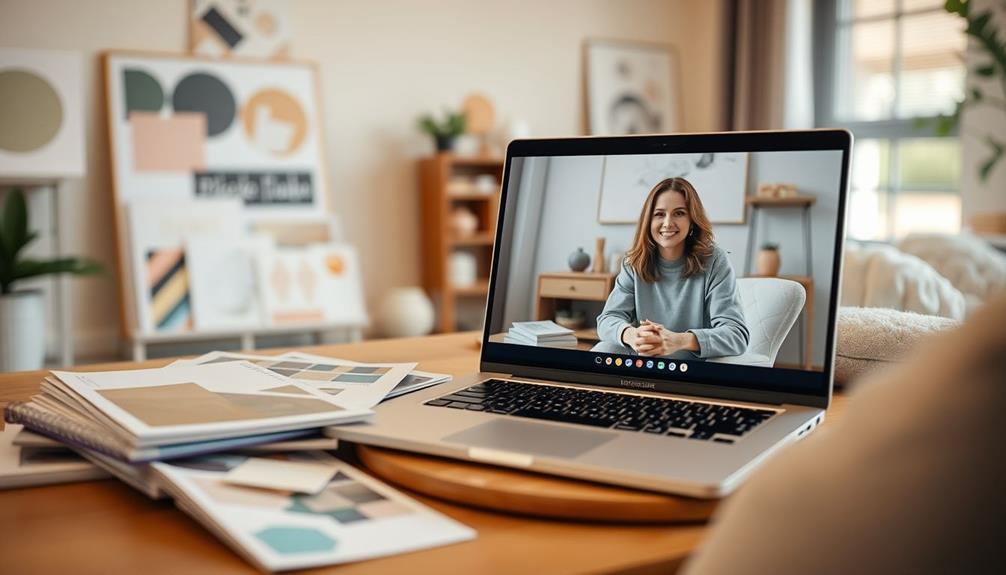
The convenience of virtual consultations is transforming how interior designers connect with clients. By leveraging digital platforms, you can reach potential clients far beyond your local area, greatly expanding your client base without the constraints of geography. This means more opportunities to generate leads and showcase your design ideas.
With an extensive suite of professional services, you can offer tailored solutions that cater to unique client needs, enhancing both functionality and aesthetics in their spaces innovative design solutions.
Offering virtual consultations provides clients with easy access to your expertise, making it more likely they'll inquire about your services. You can effectively engage clients by presenting personalized solutions tailored to their needs.
Incorporating tools like 360-degree video tours during these consultations enhances design visualization, allowing clients to grasp your concepts better and sparking their interest in your work.
To maximize your reach, regularly promote your virtual consultation services on social media and your website. This not only attracts new clients but also positions you as an innovative leader in the industry.
Tracking and Analyzing Results

Tracking and analyzing results is essential for refining your lead generation strategies. By implementing effective tools and techniques, you can gain valuable insights into what works and what doesn't.
Here are some key areas to focus on:
- Use Google Analytics to understand website traffic sources and identify effective lead generation strategies.
- Regularly monitor social media engagement metrics, including likes, shares, and comments, to see what content resonates with potential clients.
- Utilize CRM software for tracking lead interactions and conversion rates, which helps in refining your marketing strategies.
- Conduct A/B testing on different marketing campaigns to determine which messages yield the highest response rates.
Conclusion
In the vibrant world of interior design, think of lead generation as the canvas where your creativity comes alive. By embracing these strategies, you're not just filling your pipeline; you're weaving a tapestry of connections that transforms spaces and lives. Picture potential clients walking into beautifully designed rooms, inspired by your vision. So, harness these techniques, let your passion shine, and watch your business bloom like a well-tended garden, full of opportunities waiting to flourish.
